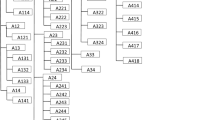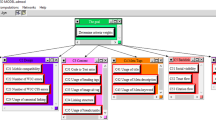Abstract
Nowadays, the patients and physicians use the health-related websites as an important information source and, therefore, it is critical the quality evaluation of health- related websites. The quality assessment of health-related websites becomes especially relevant because their use imply the existence of a wide range of threats which can affect people’s health. Additionally, website quality evaluation can also contribute to maximize the exploitation of invested resources by organizations in the development of user-perceived quality websites. But there is not yet a clear and unambiguous definition of the concept of website quality and the debate about quality evaluation on the Web remains open. In this paper, we present a qualitative and user-oriented methodology for assessing quality of health-related websites based on a 2-tuple fuzzy linguistic approach. To identify the quality criteria set, a qualitative research has been carried out using the focus groups technique. The measurement method generates linguistic quality assessments considering the visitors’ judgements with respect to those quality criteria. The combination of the linguistic judgements is implemented without a loss of information by applying a 2-tuple linguistic weighted average operator. This methodology means an improvement on quality evaluation of health websites through the commitment to put users first.

Similar content being viewed by others
References
Aladwani A, Palvia P (2002) Developing and validating an instrument for measuring user-perceived web quality. Inform Manag 39:467–476
Arfi B (2005) Fuzzy decision making in politics: A linguistic fuzzy-set approach (lfsa). Political Anal 13(1):23–56
Bedell S, Agrawal A, Petersen L (2004) A systematic critique of diabetes on the world wide web for patients and their physicians. Int J Med Inform 73:687–694
Berland G, Elliott M, Morales L, Algazy J (2001) Health information on the internet: Accessibility, quality, and readability in english and spanish. J Am Med Assoc 285(20):2612–2621
Bernhardt J, Felter E (2004) Online pediatric information seeking among mothers of young children: results from a qualitative study using focus groups. J Med Internet Res 6:e7
Breckons M, Jones R, Morris J, Richardson J (2008) What do evaluation instruments tell us about the quality of complementary medicine information on the internet? J Med Internet Res 10(1):e3. doi:10.2196/jmir.961
Childs S (2004) Developing health web site quality assessment guidelines for the voluntary sector: outcomes from the judge project. Health Inform Libr 21:14–26
Childs S (2005) Judging the quality of internet-based health information. Perform Meas Metr 6(2):80–96
Christensen H, Griffiths K (2000) Sites for depression on the web: a comparison of consumer, professional and commercial sites. Aust N Z J Public Health (24):396–400
Coiera E (1998) Information epidemics, economics, and immunity on the internet. Br Med J 317:1469–1470
Cooke A, Gray L (2002) Evaluating the quality of internet-based information about alternative therapies: development of the biome guidelines. J Public Health Med 24:261–267
Craigie M, Loader B, Burrows R, Muncer S (2002) Realibility of health information on the internet: an examination of expert ratings. J Med Internet Res 4(1):e2
Dhyani D, Keong Ng W, Bhowmick S (2002) A survey of web metrics. ACM Comput Surv 34(4):469–503
Diering C, Palmer M (2001) Professional information about urinary incontinence on the world wide web. J Wound Ostomy Cont Nurs 28:55–62
Eysenbach G (2003) The impact of the internet on cancer outcomes. CA Cancer J Clin (53):356–371
Eysenbach G, Ryoung E, Diepgen T (1999) Shopping around the internet today and tomorrow: towards the millennium of cybermedicine. Br Med J 319:1294
Eysenbach G, Powell J, Kuss O, Sa E (2002) Empirical studies assessing the quality of health information for consumers on the world wide web. A systematic review. J Am Med Assoc 287(20):2691–2700
Fox S, Rainie L (2003) The online health care revolution: how the web helps Americans take care of themselves. Pew Internet and American Life Project, Washington DC
Galimberti A, Jain S (2000) Gynaecology on the net: evaluation of the information on hysterectomy contained in health-related web sites. J Obstet Gynaecol 20:297–299
Griffiths K, Christensen H (2000) Quality of web based information on treatment of depression: cross sectional survey. Br Med J 321:1511–1515
Grigoroudis E, Litos C, Moustakis V, Politis Y, Tsironis L (2008) The assessment of user-perceived web quality: application of a satisfaction benchmarking approach. Eur J Oper Res187:1346–1357
Herrera F, Herrera-Viedma E (1997) Aggregation operators for linguistic weighted information. IEEE Trans Syst Man Cybern Part A Syst Hum 27:646–656
Herrera F, Herrera-Viedma E (2000) Linguistic decision analysis: steps for solving decisions problems under linguistic information. Fuzzy Sets Syst 115:67–82
Herrera F, Martínez L (2000) A 2-tuple fuzzy linguistic representation model for computing with words. IEEE Trans Fuzzy Syst 8(6):746–752
Herrera F, Herrera-Viedma E, Verdegay J (1996) Direct approach processes in group decision making using linguistic owa operators. Fuzzy Sets Syst 79:175–190
Herrera-Viedma E (2001) An information retrieval system with ordinal linguistic weighted queries based on two weighting elements. Int J Uncertain Fuzziness Knowl Based Syst 9:77–88
Herrera-Viedma E, Peis E (2003) Evaluating the informative quality of documents in sgml-format using fuzzy linguistic techniques based on computing with words. Inform Process Manag 39(2):195–213
Herrera-Viedma E, Pasi G, Lopez-Herrera A, Porcel C (2006) Evaluating the information quality of web sites: a methodology based on fuzzy computing with words. J Am Soc Inform Sci Technol 57(4):538–549
Huizingh E (2000) The content and design of web sites: an empirical study. Inform Manag 37(3):123–134
Impicciatore P, Pandolfini C, Casella N, Bonati M (1997) Reliability of health information for the public on the world wide web. Br Med J 314:1875–1879
Ivory M (2003) Automated web site evaluation. Kluwer, Dordrecht
Katerattanakul P, Siau K (1999) Measuring information quality of web sites: development of an instrument. In: Proceedings of 20th international conference on information systems, pp 279–285
Kim P, Eng T, Deering M, Maxfield A (1999) Published criteria for evaluating health-related web sites: a review. Br Med J 318:647–649
Kirakowski J, Cierlik B (1998) Measuring the usability of web sites. In: Proceeding of human factors and ergonomics society 42nd annual meeting, Santa Monica, CA
Kitzinger J (1994) The methodology of focus groups: the importance of interactions between research participants. Sociol Health Illn 16:103–121
Kitzinger J (1995) Introducing focus groups. Br Med J 311:299–302
Korgaonkar P, Wolin L (1999) A multivariate analysis of web usage. J Advert Res 39:53–68
Krueger R (1997) Developing questions for focus groups (focus group kit). Sage, Thousand Oaks
Li L, Irvin E, Guzman J, Bombardier C (2001) Surfing for back pain patients: the nature and quality of back pain information on the internet. Spine 26:545–557
Lissman T, Boehnlein JK (2001) A critical review of internet information about depression. Psychiatr Serv 52(8):1046–1050
Marshall L, Willians D (2006) Health information: does quality count for the consumer? how consumers evaluate the quality of health information materials across a variety of media. J Librariansh Inform Sci 38:141–156
Meric F, Bernstam E, Mirza N, Hunt K, Ames F, Ross M, Kuerer H, Pollock R, Musen M, Singletary S (2002) Breast cancer on the world wide web: cross sectional survey of quality of information and popularity of websites. Br Med J 324:577–581
Morgan D (1997) The focus groups guidebook (focus group kit). Sage, Thousand Oaks
Negash S, Ryan T, Igbaria M (2003) Quality and effectiveness in web-based customer support systems. Inform Manag 40:757–768
Olsina L, Rossi G (2002) Measuring web application quality with webqem. IEEE Multimed October–December:20–29
Olsina L, Covella G, Rossi G (2006) Web engineering. In: Mendes E, Mosley N (eds) Web quality. Springer, Berlin
Pandolfini C, Impicciatore P, Bonati M (2000) Parents on the web: risks for quality management of cough in children. Pediatrics 105:e1
Powell T, Jones D, Cutts D (1998) Web site engineering: beyond web page design. Prentice Hall, Englewood Cliffs
Provost M, Koompalum D, Dong D, Martin B (2006) The initial development of the webmedqual scale: domain assessment of the construct of quality of health web sites. Int J Med Inform 75:42–57
Quintana Y, Feightner J, Wathen C, Sangster L, Marshall J (2001) Preventive health information on the internet—qualitative study of consumers’ perspectives. Can Fam Phys 47:1759–1765
Rieh S (2002) Judgment of information quality and cognitive authority in the web. J Am Soc Inform Sci Technol 53(2):145–161
Risk A, Dzenowagis J (2001) Review of internet health information quality initiatives. J Med Internet Res 3(4):e28
Sellito C, Burgess S (2005) Towards a weighted average framework for evaluating the quality of web-located health information. J Inform Sci 31(4):260–272
Sieving P (1999) Factors driving the increase in medical information on the web—one american perspective. J Med Internet Res 1(1):e3
Stavri P, Freeman D, Burroughs C (2003) Perception of quality and trustworthiness of internet resources by personal health information seekers. In: AMIA symposium proceedings, pp 629–633
Stewart D, Shamdasani P (1990) Focus groups: theory and practice (applied social research methods). Sage, Newbury Park
Yang Z, Cai S, Zhou Z, Zhou N (2005) Development and validation of an instrument to measure user perceived service quality of information presenting web portals. Inform Manag 42:575–589
Zadeh L (1975) The concept of a linguistic variable and its applications to approximate reasoning. Inform Sci Part I, II, III 8, 8, 9:199–249, 301–357, 43–80
Zhang P, von Dran G (2001) User expectations and rankings of quality factors in different website domains. Int J Electron Commer 6(2):9–33
Acknowledgments
This work has been supported by the research project EMCA08-05 from “Programa EMCA”, Murcia, Spain. It has also been developed with the financing of FEDER funds in FUZZYLING project (TIN2007-61079), PETRI project (PET2007-0460), and project of Ministry of Public Works (90/07).
Author information
Authors and Affiliations
Corresponding author
Rights and permissions
About this article
Cite this article
Moreno, J.M., Morales del Castillo, J.M., Porcel, C. et al. A quality evaluation methodology for health-related websites based on a 2-tuple fuzzy linguistic approach. Soft Comput 14, 887–897 (2010). https://doi.org/10.1007/s00500-009-0472-7
Published:
Issue Date:
DOI: https://doi.org/10.1007/s00500-009-0472-7




